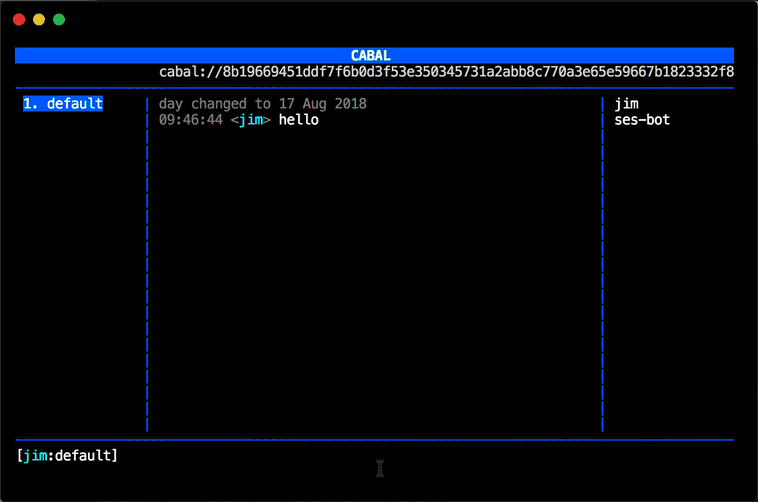A bot hosting daemon for cabal, an experimental p2p community chat platform.
Uses "Secure Ecmascript" so that participants in the cabal chat can create their own bots ... the code is "untrusted" and runs in a sandbox.
I was inspired to write this after seeing Brian Warner's talk titled "Fearless Cooperation: Giving eval() to your worst enemy for fun and profit" at the 2018 Distributed Web Summit in San Francisco.
There is more than a decade of research into how to sandbox Javascript. For more background on the "Frozen Realms" proposal for Ecmascript, check out:
- Github: tc39/proposal-frozen-realms
- Video: Frozen Realms: Draft Standard Support for Safer JavaScript Plugins - Mark Miller explains how sandboxing works
This is an experiment in using some pretty cutting edge security sandboxing technology, so be careful with it. I may have made mistakes and the core security technology is really new.
First, install cabal and start up a new cabal instance, eg:
cabal --db ./db
You can use an existing cabal, but make sure the owner of the cabal is okay with you running bots there.
Then clone this repo, do an npm install, and run it with the following arguments:
node -r esm index --key <cabal hex key> --dir ~/.cabal-ses-bot/dev --nick ses-bot
It should connect to your cabal using the nickname 'ses-bot' for the master control bot.
Assuming you named your master control bot "ses-bot", you can send it the following commands:
-
ses-bot helpDisplays list of commands.
13:08:22 <jim> ses-bot help 13:08:22 <ses-bot> Supported commands: 13:08:22 <ses-bot> 13:08:22 <ses-bot> * help 13:08:22 <ses-bot> * register <nick> <dat url> 13:08:23 <ses-bot> * ps 13:08:23 <ses-bot> * kill <pid> 13:08:23 <ses-bot> * killall 13:08:23 <ses-bot> * resurrect <pid> 13:08:23 <ses-bot> * update <pid> -
ses-bot register <nick> <dat url>Creates a new bot. It is attached to the 'nick' provided. The javascript file hosted at the dat://... url will be loaded and used as the message handler for the bot. You can use Beaker Browser to host and create dat urls and you can even edit the files in the browser. Alternatively, you can use the dat cli to upload/host your bot scripts.
13:22:04 <jim> ses-bot register echo-bot dat://9bfa25a2edf2c1d9ca6b800acfbb5d100f4488e50798a78300d1b352427f9897/echo-bot.js 13:22:04 <ses-bot> Bot registered at PID 1 -
ses-bot psDisplays list of bot processes.
13:09:59 <jim> ses-bot ps 13:09:59 <ses-bot> PID: 0 ses-bot 13:09:59 <ses-bot> PID: 1 echo-bot 13:10:00 <ses-bot> PID: 2 counter-bot -
ses-bot kill <pid>"Kills" a bot. Bots don't really run continuously, so this is really just disconnecting it from incoming messages.
13:23:17 <jim> ses-bot kill 1 13:23:17 <ses-bot> Killed PID 1 -
ses-bot killall"Kills" all the bots. Use this if the bots are misbehaving.
13:25:32 <jim> ses-bot killall 13:25:32 <ses-bot> Killed PIDs: 1 2 -
ses-bot resurrect <pid>"Unkills" a bot.
13:28:42 <jim> ses-bot resurrect 1 13:28:42 <ses-bot> Resurrected PID 1 -
ses-bot update <pid>Reloads the bot handler from the dat url it was originally loaded from. Useful if you are doing development.
13:31:02 <jim> ses-bot update 1 13:31:02 <ses-bot> Updated PID 1
The 'sample-bots' directory in the source provide source for two simple bots:
-
Simply echos back whatever a user sends to it.
13:33:37 <jim> echo-bot hello 13:33:37 <echo-bot> jim: Echo "hello" -
Demonstrates using "state". Keeps track of an integer counter that anybody can increment or decrement.
13:35:15 <jim> counter-bot help 13:35:15 <counter-bot> Supported commands: "incr", "decr" 13:35:19 <jim> counter-bot incr 13:35:19 <counter-bot> Incremented => 1 13:35:20 <jim> counter-bot incr 13:35:20 <counter-bot> Incremented => 2 13:35:24 <jim> counter-bot decr 13:35:24 <counter-bot> Decremented => 1
There isn't much of an API yet. Let's look at the source from echo-bot.js. Each bot just exports a default function that will receive every message posted into the cabal chat (from all users, for every channel):
module.exports = handleMessage
async function handleMessage (botName, message, state, refs) {
const {channel, content, author} = message
// ... bot logic here
}Normally, you'll want to only respond to messages directed at the registered name of the bot:
const regex = new RegExp(`^${botName}[ :] *(.*)$`)
const match = content.match(regex)
if (!match) returnYou can log output for debugging which will show up on the console of the bot daemon:
console.log(`Message: (${channel}) ${author}: "${content}"`)(Pro-tip: Run the daemon with DEBUG=ses-bot for verbose debug output)
There is a chat.send() global object and method for sending messages back:
const rest = match[1]
chat.send({
channel,
message: `${author}: Echo "${rest}"`
})For a slightly more advanced example, look at the source from counter-bot.js to see how you can read state from the state argument, and save state using the setState() global method. The state is persisted to a JSON file on disk after each invocation so it won't be lost when the daemon is restarted.
There is also a refs and setRefs() object for saving objects that won't be saved to JSON. These will be lost when the daemon is restarted.
Here is a short (2 minute) walkthrough showing how to create bots:
- Bots can create/publish their own Dat archives
- Bots can download Dat archives from swarm
- Bots can subscribe to changes on a Dat archive
- IPFS
- SSB
- More sample bots, eg. Eliza, polls, etc.
- Resource limits
- Access control
- Modular endowment mixins
MIT
